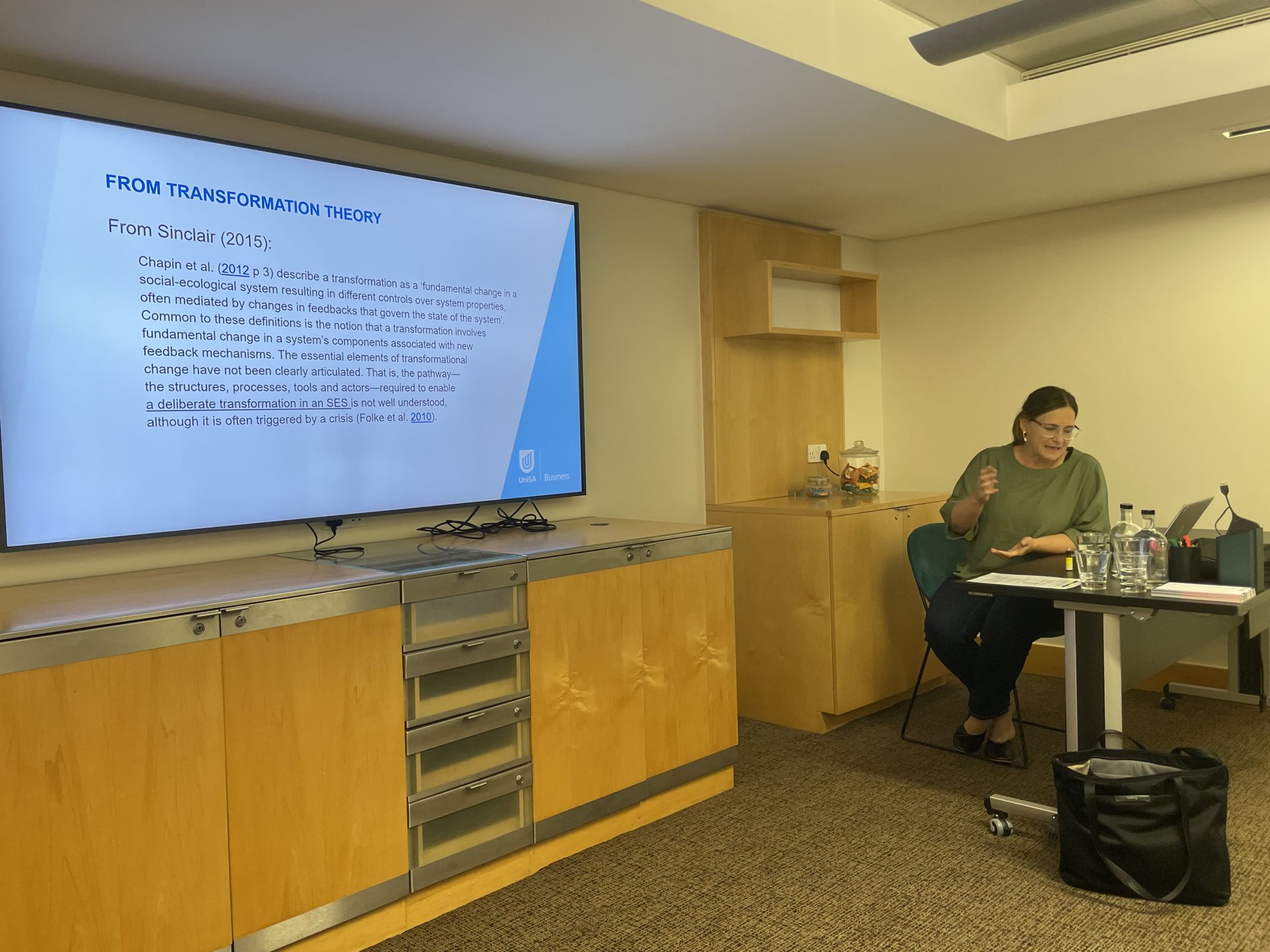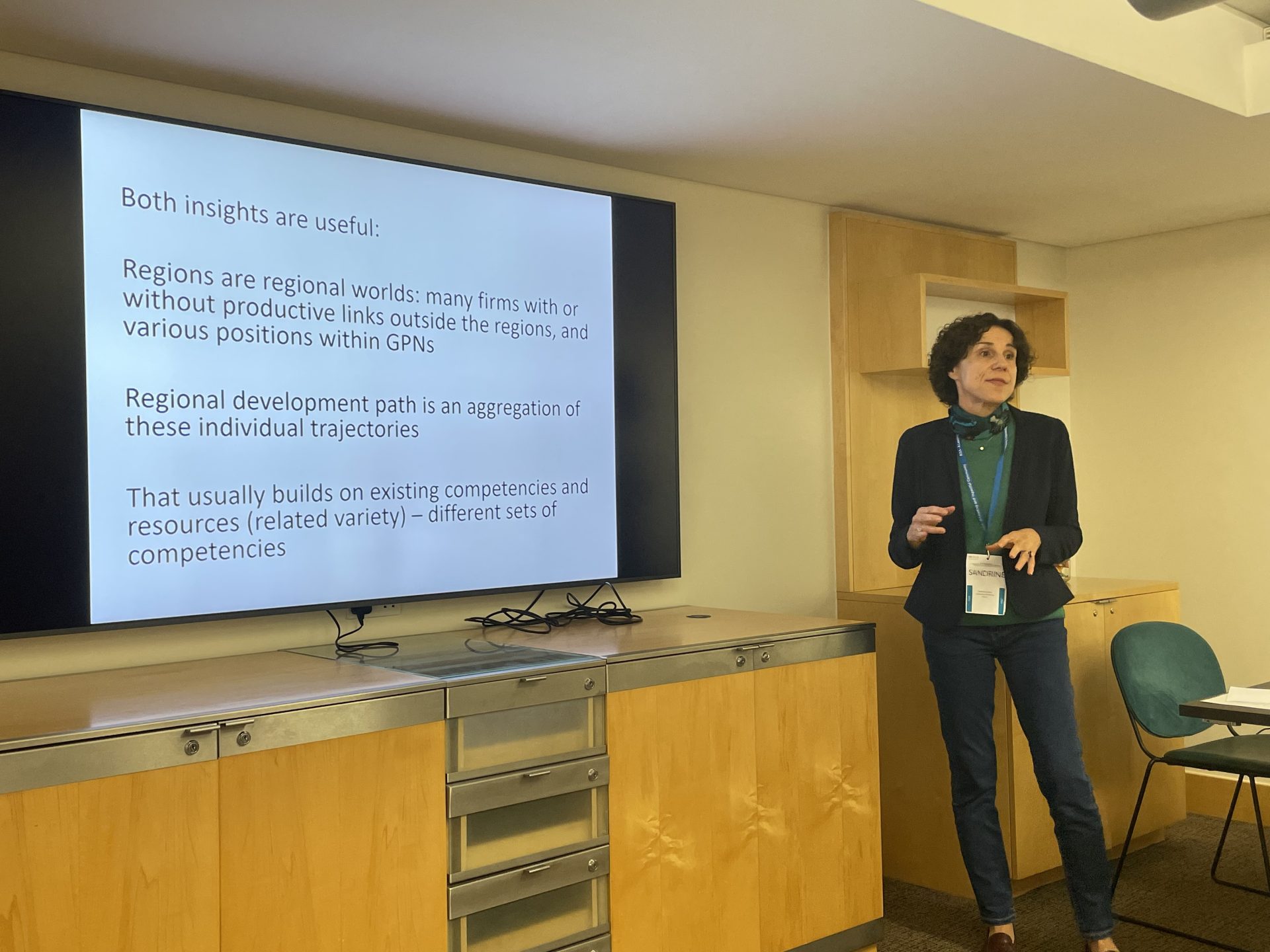The Future Work Future Communities (FWFC) team convened a special session on ‘Understanding the Multi-Scalar Impact of a Just Transition on Cities and Regions’ at the Regional Studies Association’s Winter Conference held last November 2024 in London.
The session was chaired by FWFC co-investigator David Bailey, with contributions from UniSA FWFC project members Josefina- Atienza, Helen Dinmore and Sally Weller. The session also included presentations by Sandrine Labory (University of Ferrara, Italy) and David Bailey (University of Birmingham, UK). The well-attended session stimulated much debate and discussion.
Josefina Atienza (University of South Australia) kicked things off with a presentation on ‘Just Transitions in the Australian Automotive Sector?’. The presentation examined both the processes and the outcomes of the closure of the Australian passenger vehicle industry in 2017, making use of a Just Transitions lens to assess the wider impacts of this change. The presentation highlighted that the process of transition for former employees was shaped by the distinctive characteristics of Australia’s system of industrial relations and the ambition of its governments to have as many affected workers find employment as possible. This objective was prioritised over quality of employment or the emerging skill needs of industries. While former auto workers have been able to re-establish themselves in the labour market, the management of this major change does not meet the expectations of a Just Transition as too little attention was directed to the wider societal impacts of this transformation.
Next, Helen Dinmore (University of South Australia) presented on ‘Exploring the Transition in ‘Just Transition’: Insights from an Industry Closure’. Helen noted that there has been considerable debate around the nature and dimensions of a Just Transition, with researchers commonly focussed on better understanding its expression with respect to the many ways in which justice can be construed – with respect to procedures, equity between generations, environmental concerns and societal outcomes. Helen highlighted that much less attention has been paid to the question of transition itself as well as a need to consider in more depth the time frames of interest, and whether short, medium or long term perspectives should be applied to evaluating change at the regional scale. The presentation drew on data from a long-term study of the impacts of the closure of the Australian car industry to explore these themes. It looked at the impact of closure-specific and economy wide processes, while also examining survey and Census data to document the nature and extent of change over time.
 Helen Dinmore presenting ‘Exploring the Transition in ‘Just Transition’: Insights from an Industry Closure’
Helen Dinmore presenting ‘Exploring the Transition in ‘Just Transition’: Insights from an Industry Closure’
This was followed by Sally Weller who presented on ‘Evaluating Targeted Labour Market Interventions’. While often seen as beneficial, Sally highlighted these types of interventions are starting to be questioned: first from the left, on the grounds that they work to maintain the privilege of already advantaged segments of the labour force, and second from the economistic right, which contends that their macro-economic implications have not been adequately addressed. This paper begins by laying out an outcomes-based framework for evaluating crisis-based labour market interventions. It then examines the post-retrenchment labour outcomes for workers retrenched from jobs in Australia’s automotive sector in 2016-17 using the method -–discrete-time event history analysis. The analysis suggests that interventions improved employment outcomes but that personal characteristics, household circumstances and ascribed skill remain the most important factors shaping outcomes. The discussion argues that the interventions did not alter – or seek to alter – the skill profile of the retrenched worker, but rather focused improving the marketability of existing skills.
Next, Sandrine Labory (University of Ferrara, Italy) presented a joint paper (with Lisa De Propris (University of Birmingham, UK) on ‘Rethinking Regional Development Policy for Regions and GPNs: the Case of Emilia Romagna’. This presentation analysed a specific case of regional industrial policy that has developed an interpretation of the EU’s Smart Specialisation Strategy as a policy for regional production networks. The case is that of the Emilia-Romagna region in Italy, which has designed and implemented a new policy instrument, called Clust-ER, favouring related variety in regions considered as open worlds of production. It is therefore an interesting example of regional policy at the intersection of the EEG and GPN literatures, and which may be of interest to researchers and other regions.
 Sandrine Labory presenting ‘Rethinking Regional Development Policy for Regions and GPNs: the Case of Emilia Romagna’
Sandrine Labory presenting ‘Rethinking Regional Development Policy for Regions and GPNs: the Case of Emilia Romagna’
Finally, David Bailey presented joint work with David Hearne and Alex de Ruyter which explored union worker perceptions of the potential impact of the transition to low-carbon technologies in the automotive industry in the West Midlands and North East of England, in the context of debates over ‘just transitions’. The work finds striking differences in worker confidence across the two regions driven by a range of factors including: training and skills; energy security and supply; anchor firm strategy; land availability, costs and planning; shifting comparative advantage; the nature of radical transformation; infrastructure; the supply chain; industrial policy; and the role of place leadership. This suggests that not all regions are equally well placed to take advantage of the opportunities offered by the multiple transitions (green, digital and skills) and a failure to do so poses the risk of further decline and upheaval. The presentation highlighted key policy implications. In particular, skills upgrading was seen as a necessary but not sufficient core mechanism for fostering regional resilience in the face of technical change. Rather, this upgrading needs to be linked to a more holistic and active place-based industrial policy.